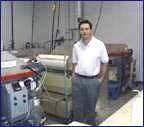
Curated with aloha by
Ted Mooney, P.E. RET

The authoritative public forum
for Metal Finishing 1989-2025

-----
Prevention of Corrosion (on cars)
Q. I am working on a Science project dealing with Corrosion. Our group needs to find a good metal that is light enough and that does not rust easily. We're designing a car. If you have any ideas for a good "car metal" please let me know!
Arielle Campion- Stratford, Ont., Canada
A. You may want to choose to make your car part out of aluminum or stainless steel then. If you want a light metal, then choose aluminum. Stainless steel is very heavy. You should know, however, that ALL metals rust including aluminum and stainless steel.
Aluminum rusts so quickly that it forms an outer layer of aluminum oxide that shields the part from more corrosion. (Rusted aluminum is called aluminum oxide) This is why people commonly think that aluminum does not rust.
Stainless steel is an alloy (a mix) of many different metals. The stainless steel alloy is very resistant to corrosion and only corrodes very very slowly. Since is corrodes only a little, and very very slowly, people consider it rust-free.

Tim Neveau
Rochester Hills, Michigan
A. Mme Arielle,
You ask about corrosion and then special metals. Pourquoi?
Most standard cars are made of metals ... and used to be entirely made of metal, mainly steel. Nowadays you'll see plastic components, wheel arch guards, bumpers and (in some cars) entire doors or fender components.
For high speed rally cars even wheel rims are made of plastic, using carbon fibre. What do you think the space craft and space rockets are made of? Metal? Some, but not much! Then racing cars will have hoods and fenders made of carbon fibre. Why? It's very, very light. Very strong. Resistant to normal atmospheric conditions and, being a plastic, it cannot RUST!
As Tim pointed out very clearly, metals can rust (ah, well, standard metals, not GOLD and a few other exotics!) but the word 'stainless' is a clever but not an accurate word choice. The French call it acier inoxydable or non oxidizing steel ... in Germany they call it rostfreier stahl, rust free steel.
From a structural viewpoint I'd guess that any ultra high performance vehicle has a main 'metal' chassis onto which is joined a lightweight, ultra stiff carbon fibre body. Maybe, probably, too, the chassis is made of Titanium ... which doesn't rust but which costs an arm and a leg!
There's no simple, inexpensive and practical metal that won't corrode... which is why they chose paints with a plastic base !
I hope this will help you and not confuse you too much.

Freeman Newton [deceased]
(It is our sad duty to advise that Freeman passed away
April 21, 2012. R.I.P. old friend).
A. Hi Ariel. Since this is a website focused on surface finishing, let me build upon some comments that Freeman made, while steering them a bit further towards surface finishing considerations.
In terms of corrosion resistance, what metal a car is made of may not really be as important as how the surfaces react to corrosive conditions. If plain steel is inexpensive, strong and versatile, and has many other properties that recommend it, maybe we could be asking "how can we make plain steel more corrosion resistant?", rather than only asking "why not use more expensive, less versatile stainless steel material to deal with the fact that steel corrodes?". Proper pretreatment including galvannealing (galvanizing followed by annealing), phosphatization, electrocoat priming, and finish painting can yield a very satisfactory, highly corrosion resistant plain steel car.
Aluminum has much to recommend it based on its weight, as does carbon fiber. But stainless steel seems to offer no weight advantage, and titanium is a little lighter than steel, but sounds limited as well as unreasonably expensive. Let us know how the project works out :-)
Regards,

Ted Mooney, P.E.
Striving to live Aloha
finishing.com - Pine Beach, New Jersey
December , 2012
Q, A, or Comment on THIS thread -or- Start a NEW Thread